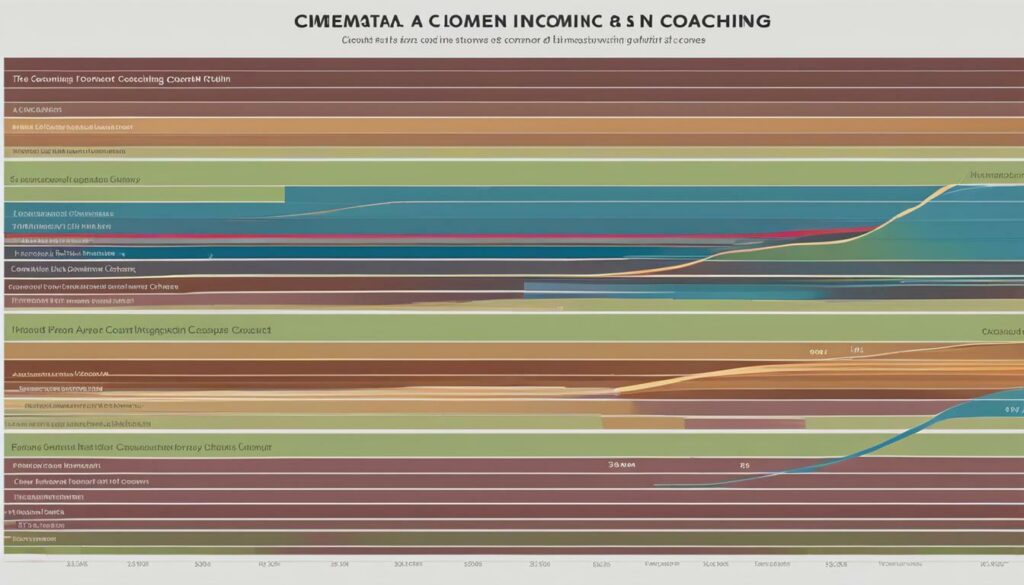Have you ever wondered if coaching could become a successful career path for you? Many individuals find themselves seeking new opportunities and considering a shift in their professional life. While the decision to pursue coaching may seem daunting, it’s important to explore the numerous possibilities and potential for growth within the industry.
The coaching industry falls under the umbrella of the wellness economy, a rapidly growing sector projected to reach nearly $7.0 trillion by 2025. This exponential growth presents a wealth of opportunities for aspiring coaches, as the demand for their services continues to rise in the pursuit of personal development and well-being.
When it comes to salary potential, life coaches in North America earn an average annual income of $62,500. While individual earnings may vary based on factors such as specialization and experience, this figure demonstrates that a coaching career can offer a competitive income, making it a viable option for those seeking financial stability.
While formal training or licensure is not mandatory to become a coach, investing in an ICF accredited certification program can provide the essential scientific frameworks and tools needed for success. These programs equip coaches with the necessary skills to build trust, practice empathy, ask powerful questions, and provide the guidance and support their clients need.
Building a personal brand as a coach is also crucial for attracting clients and establishing credibility. Utilizing storytelling techniques and showcasing expertise can help coaches connect with their audience and differentiate themselves in a competitive industry.
Diversifying offerings, such as group coaching programs or consulting services, can contribute to a sustainable and thriving coaching business. This allows coaches to reach a wider audience and serve clients with different needs, ensuring a more stable income stream.
When seeking a career coach, it’s important to find the right fit. Consider their specialization, certifications, and experience, and be open to services beyond resume building. Trying sample sessions with multiple coaches can help determine the best match for your unique needs and goals.
Career coaching can benefit individuals in various situations, whether they feel stuck, desire a career change, seek work-life balance, or want to enhance their current career. Unlike career counseling, which often focuses on immediate goals, career coaching takes a proactive, future-oriented approach that emphasizes personal growth and long-term success.
- The coaching industry is part of the rapidly growing wellness economy, offering ample career opportunities.
- Life coaches in North America earn an average annual income of $62,500.
- Investing in an ICF accredited coach certification program can provide the necessary skills and knowledge for success.
- Establishing a personal brand and utilizing storytelling techniques can help coaches attract clients and build credibility.
- Diversifying coaching offerings, such as group programs or consulting services, can contribute to a sustainable and thriving coaching business.
The Growing Demand for Coaches in the Wellness Economy
As the wellness economy continues to expand, coaching has emerged as a promising profession with numerous benefits. With people becoming more invested in their overall well-being, the demand for coaches who can provide guidance and support in various areas of life has skyrocketed. Whether it’s career coaching, life coaching, or executive coaching, the need for qualified professionals in these fields is on the rise.
According to industry reports, the wellness economy is projected to reach nearly $7.0 trillion by 2025. This growth presents an array of opportunities for coaches to thrive and build successful careers. As individuals prioritize their mental health, work-life balance, and personal development, they are turning to coaches who can help them navigate these areas. Whether it’s helping someone find their purpose, overcome challenges, or make significant career transitions, coaches play a vital role in empowering individuals to achieve their goals and live fulfilling lives.
One of the significant benefits of pursuing a career in coaching is the potential for financial success. While individual earnings can vary based on factors such as specialization and experience, the average annual salary for life coaches in North America is $62,500. This compares favorably to many other professions and highlights the financial viability of a coaching career.
| Benefits of a Coaching Career | Salary Potential | Growing Demand |
|---|---|---|
| Empower others to achieve their goals | Average annual salary of $62,500 | Rapid growth in the wellness economy |
| Flexibility in work schedule | Potential for higher earnings based on specialization and experience | Opportunities to make a significant impact in people’s lives |
| Continual personal growth and learning | Ability to diversify services and expand business | Increased focus on mental health and well-being |

When considering a career in coaching, it’s important to remember that formal training or licensure is not always necessary. However, investing in an ICF accredited coach certification program can provide you with the scientific frameworks and tools needed to excel in the field. Building essential coaching skills such as building trust, practicing empathy, asking open-ended questions, and avoiding unsolicited advice is vital for success.
Establishing a personal brand as a coach is also crucial for attracting clients and growing your business. By using storytelling techniques and credibility-building strategies, you can effectively connect with your audience and showcase your expertise. Diversifying your coaching business by offering group coaching programs or consulting services can further contribute to its sustainability and success.
In conclusion, the growing demand for coaches in the wellness economy presents countless career opportunities and prospects for those looking to make a difference in people’s lives. With a promising salary potential and the chance to empower others, coaching is a viable profession for those passionate about personal growth and helping others achieve their goals. Whether you choose to specialize in life coaching, executive coaching, or any other area, the coaching industry offers a bright and fulfilling path ahead.
The Projected Growth of the Coaching Industry
The coaching industry is expected to experience significant growth in the coming years, creating exciting opportunities for individuals considering a coaching career. As coaches are increasingly sought-after in various industries, the demand for their services is projected to rise steadily. With the wellness economy booming and projected to reach nearly $7.0 trillion by 2025, the coaching industry is well-positioned for substantial growth.
According to industry data and forecasts, the coaching industry is expected to thrive due to several factors. One of the main drivers of growth is the increasing focus on personal and professional development. More individuals are recognizing the value of investing in themselves and seeking guidance to overcome challenges and reach their goals. This growing awareness has created a demand for coaches who can provide the support and accountability necessary for personal growth and success.
Moreover, the COVID-19 pandemic has further fueled the need for coaching services. Many individuals are reassessing their careers and seeking guidance to navigate uncertain times. As a result, career and life coaching have become increasingly popular, offering opportunities for coaches to make a meaningful impact on people’s lives.
| Benefits of the Projected Growth: |
|---|
| 1. Increased demand for coaching services |
| 2. Expanded opportunities for coaches in various industries |
| 3. Higher earning potential due to increased demand |
| 4. Ability to specialize in niche coaching areas |
As the coaching industry continues to evolve, coaches have the opportunity to specialize in niche areas, catering to specific client needs. Whether it’s executive coaching, career coaching, wellness coaching, or any other specialized field, coaches can carve their own path and establish themselves as experts in their chosen areas.
In conclusion, the projected growth of the coaching industry presents exciting prospects for individuals seeking a rewarding career. With the increasing demand for coaching services and the wellness economy’s rapid expansion, there is ample room for coaches to thrive and make a significant impact. By investing in the necessary skills, certifications, and building a strong personal brand, aspiring coaches can position themselves for success in this flourishing industry.

If you’re wondering about the earning potential in the coaching field, you’ll be pleased to know that life coaches in North America earn an average annual salary of $62,500. This compares favorably to other professions and reflects the growing demand for coaching services. While individual earning potential may vary depending on factors such as coaching specialization, experience, and services offered, coaching can offer a competitive income for those willing to invest in their career.

As the coaching industry continues to grow, there are ample opportunities for coaches to thrive and expand their business. The wellness economy, which coaching falls under, is projected to reach nearly $7.0 trillion by 2025. This rapid growth indicates a strong demand for coaching services, providing a promising path for those considering a coaching career.
While it’s not necessary to have formal training or licensure to become a coach, investing in an ICF accredited coach certification program can provide the scientific frameworks and tools needed to succeed. This certification can enhance your credibility and demonstrate your commitment to professional development, attracting clients who value your expertise and knowledge.
| Benefits of Salary Potential in the Coaching Field | Benefits of Career Coaching |
|---|---|
| – Competitive average annual salary of $62,500 in North America – Potential for higher earnings based on specialization and experience – Opportunity to create a sustainable and thriving coaching business |
– Reduced burnout and increased work-life balance – Improved self-awareness and resilience – Better mental fitness and focus – Increased productivity and employee retention |
Building coaching skills is essential for success in this field. By focusing on building trust, practicing empathy, asking open-ended questions, and avoiding unsolicited advice, you can cultivate strong coaching relationships and help your clients achieve their goals. Additionally, establishing a personal brand and using storytelling techniques can help you connect with your audience and build credibility.
Quote:
If you’re passionate about helping others and have a desire to make a positive impact, a coaching career may be the right path for you. With a growing demand for coaching services and the potential for financial success, coaching offers a viable and rewarding career choice for individuals looking to make a difference in the lives of others. So why wait? Take the plunge and explore the numerous opportunities and prospects that await you in the coaching industry.
The Importance of Coach Certification
While formal training or licensure may not be mandatory to become a coach, obtaining a coach certification can provide you with the necessary tools and frameworks for success. A coach certification program, especially one accredited by the International Coach Federation (ICF), offers comprehensive training that covers the fundamental principles and techniques of coaching. It equips you with the skills needed to build rapport with clients, ask powerful questions, and facilitate transformative conversations.
By investing in a coach certification program, you gain credibility in the coaching industry. Clients are more likely to trust and hire coaches who have demonstrated their commitment to professional standards. Becoming a certified coach also opens up opportunities for networking and collaboration with other professionals in the field.
Furthermore, coach certification provides you with ongoing support and resources. Many certification programs offer access to a community of coaches, mentorship opportunities, and continuing education to help you stay updated with the latest coaching methodologies and best practices.
Benefits of Coach Certification:
- Enhances your coaching skills and knowledge
- Bolsters your credibility and trustworthiness as a professional coach
- Provides networking and collaboration opportunities
- Offers ongoing support and resources for continued growth

| Coach Certification Programs | Accreditation | Duration | Cost |
|---|---|---|---|
| ICF Accredited Coach Certification | International Coach Federation (ICF) | Varies (typically 6 months to 1 year) | $3,000 – $15,000+ |
| CTI Certification | The Coaches Training Institute (CTI) | 5 months | $9,450 |
| CoachU Core Essentials Program | Coach Training Alliance (CTA) | 6 months | $6,497 |
“Obtaining a coach certification was one of the best decisions I made for my coaching career. It not only provided me with the necessary skills and knowledge but also gave me the confidence to establish myself as a professional coach.” – Sarah, Certified Life Coach
Building Essential Coaching Skills
Developing essential coaching skills is crucial for creating a successful and fulfilling career in the coaching industry. As a coach, your ability to effectively engage with clients and guide them towards their goals will determine your success. Here are some key skills to focus on:
- Building Trust: Trust is the foundation of any coaching relationship. It’s essential to create a safe and supportive environment where clients feel comfortable opening up and exploring their aspirations and challenges. Actively listen to your clients, validate their experiences, and maintain confidentiality to build trust.
- Practicing Empathy: Empathy is the ability to understand and share the feelings of others. As a coach, it’s important to develop empathy to connect with your clients on a deeper level. Put yourself in their shoes, acknowledge their emotions, and validate their experiences. This empathy will allow you to provide compassionate support and guidance.
- Asking Open-Ended Questions: Open-ended questions encourage clients to reflect, explore, and gain deeper insights. By asking thought-provoking questions, you can help clients expand their thinking, challenge assumptions, and uncover new possibilities. This skill is vital for facilitating meaningful conversations and helping clients discover their own solutions.
- Avoiding Unsolicited Advice: As a coach, your role is not to provide answers or solve problems for your clients. Instead, focus on empowering them to find their own solutions. Avoid giving unsolicited advice and instead ask guiding questions that prompt critical thinking and self-reflection. This approach will foster client growth and autonomy.
These skills, when honed and practiced, will set you apart as a coach and enable you to make a lasting impact on your clients’ lives. Remember, coaching is a continuous learning journey, so continue to develop these skills throughout your career.

| Coaching Skill | Description |
|---|---|
| Building Trust | Create a safe and supportive environment for clients to open up and explore their aspirations and challenges. |
| Practicing Empathy | Understand and share the feelings of clients, allowing you to provide compassionate support and guidance. |
| Asking Open-Ended Questions | Encourage reflection and deeper insights by asking thought-provoking questions that challenge assumptions and uncover new possibilities. |
| Avoiding Unsolicited Advice | Empower clients to find their own solutions by refraining from providing unsolicited advice and asking guiding questions instead. |
Establishing Your Personal Brand as a Coach
Building a strong personal brand is essential for standing out in the coaching industry and attracting clients who resonate with your unique message. Your personal brand is what sets you apart from other coaches and communicates your expertise, values, and style.
One effective way to establish your personal brand is through storytelling. Sharing your own journey and experiences can create a connection with your audience and demonstrate your authenticity. Clients want to work with coaches who have been through similar challenges and have successfully overcome them.
“Your personal brand is what people say about you when you’re not in the room.”
Another important aspect of building your personal brand is credibility. Clients want to know that you have the knowledge and skills to help them achieve their goals. Obtaining an ICF accredited coach certification can provide that credibility. It demonstrates your commitment to professional standards and your dedication to continuous learning and development.
Remember, your personal brand is not just about what you say, but also how you show up. Be consistent in your messaging, appearance, and online presence. Use social media platforms and your website to showcase your expertise, share valuable content, and engage with your audience.
Building Trust and Attracting Clients
Ultimately, building a strong personal brand is about building trust with your audience. Trust is the foundation of successful coaching relationships. It’s what allows clients to open up, be vulnerable, and commit to the coaching process. When clients trust you, they are more likely to refer you to others and become loyal advocates for your coaching practice.
By establishing your personal brand, you are positioning yourself as an expert in your field and attracting clients who resonate with your unique message. Your personal brand is an ongoing process that requires consistency, authenticity, and a genuine desire to help others.
So, take the time to define your personal brand, tell your story, and build credibility. Your personal brand is the key to standing out in the coaching industry and attracting clients who are ready to transform their lives.
Diversifying Your Coaching Business
Diversifying your coaching business can provide additional income streams and enhance your career prospects as a coach. By expanding your services and offering different programs, you can cater to a wider range of clients and appeal to different market segments. This not only increases your earning potential but also allows you to establish yourself as an expert in multiple areas.
One way to diversify your coaching business is by offering group coaching programs. Group coaching can be a cost-effective option for clients who may not be able to afford one-on-one sessions. It also allows you to reach more people at once, maximizing your time and resources. Group coaching fosters a sense of community and support among participants, creating a collaborative and empowering environment.
Another option is to provide consulting services in addition to coaching. Consulting allows you to leverage your expertise and provide strategic advice to clients who may be looking for guidance in specific areas of their personal or professional life. This can range from business strategy and marketing to career development and goal setting. Consulting can be offered as a stand-alone service or as an add-on to your coaching packages.
To illustrate the potential benefits of diversifying your coaching business, consider the following table:
| Service | Target Market | Income Potential |
|---|---|---|
| One-on-One Coaching | Individuals seeking personalized support and guidance | $100-$300 per hour |
| Group Coaching Programs | Small groups or organizations looking for cost-effective coaching | $500-$1,000 per program |
| Career Consulting | Professionals seeking career guidance and strategic advice | $150-$500 per session |
As you can see, diversifying your coaching business opens up new income streams and allows you to cater to different client needs. It also positions you as a versatile and well-rounded coach, which can attract a wider audience and lead to further growth opportunities. By offering a variety of services, you can create a sustainable and thriving coaching career.

If you’re considering hiring a career coach, it’s important to find the right professional who aligns with your specific needs and goals. Career coaching can cover a range of topics beyond just resume building, so it’s crucial to understand the type of services you require. Whether you’re feeling stuck in your career, contemplating a change, seeking work-life balance, or aiming to grow in your current role, career coaching can provide the guidance and support you need.
When searching for a career coach, it’s recommended to try sample sessions with multiple coaches to determine the best fit for you. Consider researching their training, certifications, and experience to ensure they have the expertise to address your unique circumstances. Price, frequency of sessions, and availability for additional support are also important factors to consider when evaluating potential coaches.
Investing in career coaching can be a transformative experience, helping you unlock your full potential and achieve your career goals. A skilled career coach can assist with reducing burnout, increasing self-awareness, improving mental fitness and focus, and enhancing productivity and employee retention. By taking a proactive and future-oriented approach, career coaching goes beyond short-term objectives and focuses on personal growth and long-term success.

Explore the possibilities of career coaching and find a professional who can guide you on your path to success. With the right career coach by your side, you can overcome obstacles, gain clarity, and take meaningful steps towards a fulfilling and rewarding career.
Understanding the Benefits of Career Coaching
Career coaching offers numerous benefits for individuals looking to achieve their career goals and unlock their full potential. Whether you are feeling stuck in your current job, contemplating a career change, seeking better work-life balance, or simply wanting to enhance your skills and grow in your profession, career coaching can provide the guidance and support you need.
Unlike traditional career counseling, which often focuses on immediate goals and short-term solutions, career coaching takes a proactive, future-oriented approach. It delves deeper into your aspirations, values, strengths, and passions to help you develop a clear vision for your career and create a plan to achieve it.
One of the key benefits of career coaching is the increased self-awareness it brings. Through self-reflection exercises and assessments, you gain a better understanding of your unique strengths, weaknesses, values, and motivators. This self-awareness enables you to make more informed decisions about your career path and align your goals with your personal values.
Another advantage of career coaching is the improved mental fitness and focus it provides. Working with a coach helps you identify and overcome limiting beliefs, fears, and self-doubt that may be holding you back from reaching your full potential. By reframing negative thoughts and adopting a growth mindset, you can enhance your confidence, resilience, and mental clarity, enabling you to navigate challenges and setbacks with greater ease.

Career Coaching vs. Career Counseling
While career counseling focuses on immediate goals and advice, career coaching takes a forward-thinking approach, aiming to empower individuals and foster personal development. Career counselors typically assist individuals in making decisions related to their careers, providing guidance on educational pathways, job search strategies, and resume building. They often focus on helping clients find employment or navigate specific career challenges.
In contrast, career coaching is a broader and more holistic approach that goes beyond immediate career needs. Coaches work with individuals to identify their strengths, values, and long-term aspirations, helping them create a vision for their career and develop action plans to achieve their goals. Career coaches focus on personal growth, self-discovery, and enhancing overall well-being, while also addressing career-related concerns.
A career coach helps clients explore their passions and interests, uncover their unique talents, and identify potential career paths that align with their values and goals. They provide support, accountability, and encouragement throughout the journey, helping clients overcome obstacles and make confident decisions. Career coaching empowers individuals to take control of their careers, build resilience, and embrace lifelong learning.
In summary, career counseling provides immediate guidance and advice for specific career challenges, while career coaching takes a proactive and future-oriented approach, helping individuals unlock their full potential and create fulfilling careers that align with their personal values and aspirations. Whether you need assistance in finding a new job, exploring career options, or seeking personal growth within your current career, career coaching can offer valuable support and guidance.
Is Coaching a Viable Career? The Promising Path Ahead
In conclusion, coaching is indeed a viable career with promising opportunities for growth and personal fulfillment. While it may be difficult to answer whether it’s worth pursuing without taking action, many successful coaches have found unexpected opportunities along the way. It’s important to acknowledge the fears and uncertainties that come with starting a coaching career, but also consider the facts and potential for growth in the industry.
The wellness economy, which coaching falls under, is a rapidly growing industry projected to reach nearly $7.0 trillion by 2025, offering ample opportunities for coaches. This growth signifies a high demand for coaching services and a need for qualified professionals. Additionally, life coaches in North America earn an average annual salary of $62,500, which compares favorably to other professions. However, it’s important to note that individual earning potential may vary depending on factors such as coaching specialization, experience, and services offered.
While it’s not necessary to have formal training or licensure to become a coach, investing in an ICF accredited coach certification program can provide the scientific frameworks and tools needed to succeed. These programs offer comprehensive training and guidance, ensuring coaches are equipped with the necessary skills to support their clients effectively. Building coaching skills requires practice and repetition, with a focus on building trust, practicing empathy, asking open-ended questions, and avoiding unsolicited advice. These skills form the foundation for a successful coaching career.
Establishing a personal brand is crucial for coaches to differentiate themselves and attract clients. By using storytelling techniques and credibility-building strategies, coaches can connect with their audience on a deeper level and establish themselves as trusted experts in their field. Diversifying their coaching business, such as offering group coaching programs or consulting services, can also contribute to a sustainable and thriving career.
When seeking a career coach, it’s important to understand the specific type of professional needed and be open to services beyond just resume building. Career coaching can cover a range of topics and provide guidance for various career goals and personal development. It is recommended to try sample sessions with multiple coaches to find the right fit and to research their training, certifications, and experience. Understanding coaching fees, session frequency, and availability for additional support is essential when making a decision.
Career coaching can benefit anyone who wants guidance in reaching their career goals and unlocking their full potential. It provides a proactive, future-minded approach to personal growth, helping individuals overcome challenges and make informed decisions. The benefits of career coaching include reduced burnout, decreased languishing, increased self-awareness and resilience, improved mental fitness and focus, and better productivity and employee retention. Overall, coaching offers a promising path for those seeking a fulfilling and impactful career.
FAQ
Q: Is coaching a viable career option?
A: Yes, coaching can be a viable career option for those looking to make a change in their professional life. Many successful coaches have found unexpected opportunities along the way.
Q: What is the projected growth of the coaching industry?
A: The coaching industry is part of the rapidly growing wellness economy, projected to reach nearly $7.0 trillion by 2025. This indicates ample opportunities for coaches.
Q: What is the average salary of life coaches in North America?
A: Life coaches in North America earn an average annual salary of $62,500, which compares favorably to other professions. Individual earning potential may vary.
Q: Do I need formal training or licensure to become a coach?
A: While not necessary, investing in an ICF accredited coach certification program can provide the scientific frameworks and tools needed to succeed as a coach.
Q: What are the essential skills for a successful coach?
A: Building trust, practicing empathy, asking open-ended questions, and avoiding unsolicited advice are essential skills for becoming a successful coach.
Q: How can I establish my personal brand as a coach?
A: Establishing a personal brand can be done through storytelling techniques and credibility-building strategies, which help coaches connect with their audience and build credibility.
Q: How can I diversify my coaching business?
A: Offering group coaching programs or consulting services can contribute to a sustainable coaching business and provide additional income streams.
Q: How do I find the right career coach?
A: It’s important to consider coaching specializations, certifications, and experience when finding the right career coach. Trying sample sessions with multiple coaches can help find the right fit.
Q: What are the benefits of career coaching?
A: Career coaching can reduce burnout, improve self-awareness and resilience, enhance mental fitness and focus, and increase productivity and employee retention.
Q: How is career coaching different from career counseling?
A: Career coaching takes a proactive, future-minded approach focused on personal growth, while career counseling may be more immediate goal-oriented.
What Are the Benefits of Hiring an Executive Coach?
The advantages of hiring an executive coach are significant when it comes to executive coaching effectiveness explored. These professionals provide personalized guidance, enhancing leadership skills, improving decision-making abilities, and boosting overall performance. By tapping into their expertise, executives gain fresh perspectives, refine strategies, and overcome challenges, resulting in increased professional growth and success.
